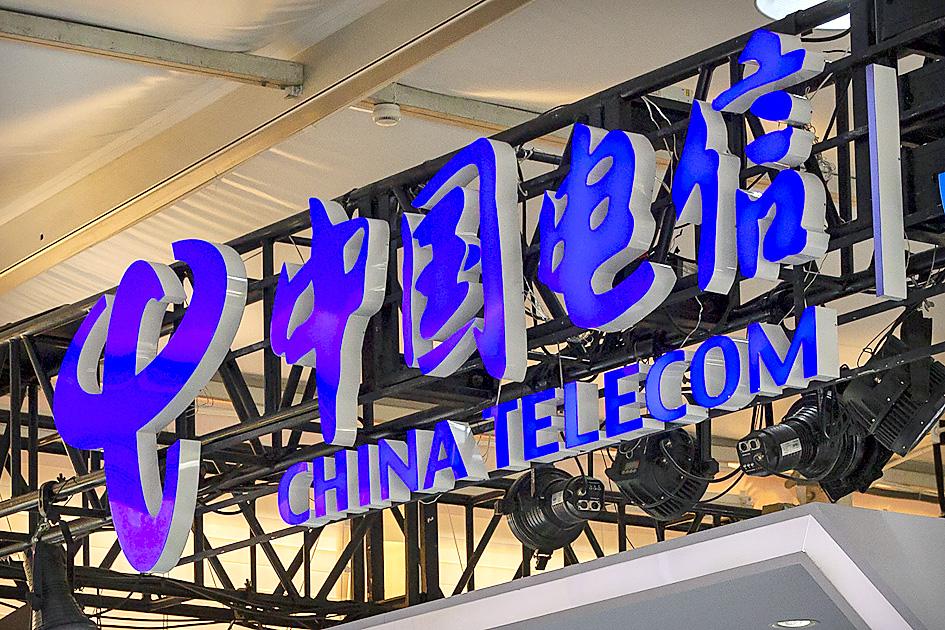The US on Tuesday banned China Telecom Corp (中國電信) from operating in the country, citing “significant” national security concerns.
The US Federal Communications Commission (FCC) ordered China Telecom Americas Corp to discontinue its services within 60 days, ending nearly 20 years of operations in the US.
The firm’s “ownership and control by the Chinese government raise significant national security and law enforcement risks,” the FCC said in a statement.

Photo: AP
It gives opportunities for Beijing “to access, store, disrupt, and/or misroute US communications, which in turn allow them to engage in espionage and other harmful activities against the United States,” it said.
“The FCC’s decision is disappointing,” China Telecom spokesman Ge Yu (葛宇) said in an e-mail, Bloomberg News reported. “We plan to pursue all available options while continuing to serve our customers.”
There was no response to an e-mail sent to the press contact at the Chinese embassy in Washington.
The announcement on Tuesday ramped up concerns about further measures against Chinese tech firms and battered shares in such firms listed in New York.
The selling continued yesterday in Hong Kong, where Chinese tech firms experienced hefty selling, pulling the Hang Seng Index 1.6 percent lower.
The Hang Seng Tech Index lost more than 3 percent, with Tencent Holdings Ltd (騰訊), Alibaba Group Holding Ltd (阿里巴巴), JD.com Inc (京東) and XD Inc (心動) among those taking a hit in morning trade.
The move “seems to dampen previous hopes that the US-China relations may be turning for the better,” IG Asia Pte market strategist Yeap Jun Rong said.
It “has raised some doubts as to whether further escalation may bring back more US scrutiny on Chinese technology players,” he said.
China Telecom, China’s largest fixed-line operator, was delisted by the New York Stock Exchange in January, along with fellow state-owned telecoms firms China Mobile Ltd (中國移動) and China Unicom Hong Kong Ltd (中國聯通).
That followed an executive order by then-US president Donald Trump banning investments by Americans in a range of companies deemed to be supplying or supporting China’s military and security apparatus.
The US Department of Justice in April last year threatened to terminate China Telecom’s US dealings, saying that US government agencies “identified substantial and unacceptable national security and law enforcement risks associated with China Telecom’s operations.”
The move “sends a broader message to Beijing, that regardless of who’s president, the US continues to be concerned about the risks posed by Chinese tech firms operating in the US,” the Washinton-based Center for a New American Security’s director of the technology and national security program, Martijn Rasser, told Bloomberg.

INVESTIGATION: The case is the latest instance of a DPP figure being implicated in an espionage network accused of allegedly leaking information to Chinese intelligence Democratic Progressive Party (DPP) member Ho Jen-chieh (何仁傑) was detained and held incommunicado yesterday on suspicion of spying for China during his tenure as assistant to then-minister of foreign affairs Joseph Wu (吳釗燮). The Taipei District Prosecutors’ Office said Ho was implicated during its investigation into alleged spying activities by former Presidential Office consultant Wu Shang-yu (吳尚雨). Prosecutors said there is reason to believe Ho breached the National Security Act (國家安全法) by leaking classified Ministry of Foreign Affairs information to Chinese intelligence. Following interrogation, prosecutors petitioned the Taipei District Court to detain Ho, citing concerns over potential collusion or tampering of evidence. The

‘FORM OF PROTEST’: The German Institute Taipei said it was ‘shocked’ to see Nazi symbolism used in connection with political aims as it condemned the incident Sung Chien-liang (宋建樑), who led efforts to recall Democratic Progressive Party (DPP) Legislator Lee Kun-cheng (李坤城), was released on bail of NT$80,000 yesterday amid an outcry over a Nazi armband he wore to questioning the night before. Sung arrived at the New Taipei City District Prosecutors’ Office for questioning in a recall petition forgery case on Tuesday night wearing a red armband bearing a swastika, carrying a copy of Adolf Hitler’s Mein Kampf and giving a Nazi salute. Sung left the building at 1:15am without the armband and apparently covering the book with a coat. This is a serious international scandal and Chinese

Seventy percent of middle and elementary schools now conduct English classes entirely in English, the Ministry of Education said, as it encourages schools nationwide to adopt this practice Minister of Education (MOE) Cheng Ying-yao (鄭英耀) is scheduled to present a report on the government’s bilingual education policy to the Legislative Yuan’s Education and Culture Committee today. The report would outline strategies aimed at expanding access to education, reducing regional disparities and improving talent cultivation. Implementation of bilingual education policies has varied across local governments, occasionally drawing public criticism. For example, some schools have required teachers of non-English subjects to pass English proficiency

TRADE: The premier pledged safeguards on ‘Made in Taiwan’ labeling, anti-dumping measures and stricter export controls to strengthen its position in trade talks Products labeled “made in Taiwan” must be genuinely made in Taiwan, Premier Cho Jung-tai (卓榮泰) said yesterday, vowing to enforce strict safeguards against “origin laundering” and initiate anti-dumping investigations to prevent China dumping its products in Taiwan. Cho made the remarks in a discussion session with representatives from industries in Kaohsiung. In response to the US government’s recent announcement of “reciprocal” tariffs on its trading partners, President William Lai (賴清德) and Cho last week began a series of consultations with industry leaders nationwide to gather feedback and address concerns. Taiwanese and US officials held a videoconference on Friday evening to discuss the